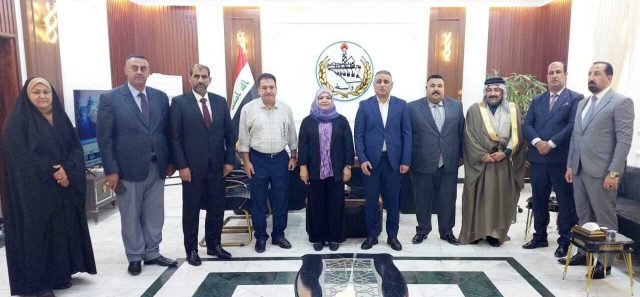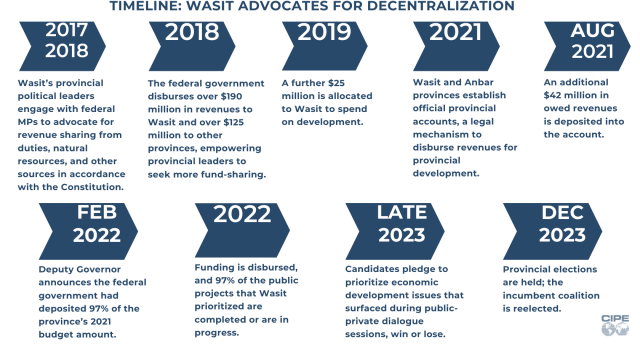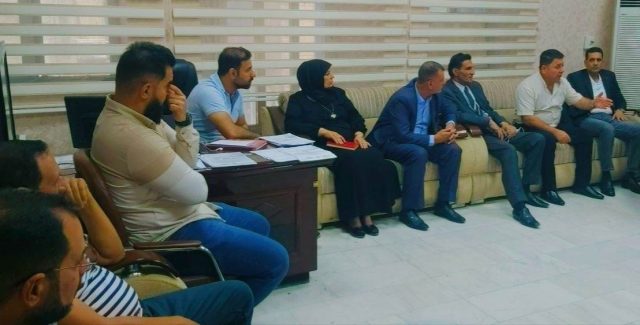Democracy puts the onus on elected leaders to deliver the outcomes residents want, which means recent elections in Iraq are a good news story. In four key provinces, voters proved what’s true in any democracy: politicians who get things done will be rewarded at the ballot box. Elected representatives in Wasit Province in particular were rewarded for a huge boost to local revenue, in large part because they were open to dialogue with private-sector groups.
Iraqi politicians and parties have typically built their campaigns on ideological or sectarian affiliations. However, incumbents in Wasit, Karbala, Anbar, and Basra won by shifting the focus from identity issues to their track record of responding to citizens’ needs. In Wasit, that process began with Inbithaq, a local NGO focused on economic development.

Inbithaq knew that Wasit’s government wasn’t getting all the funds it was entitled from oil and customs revenue, which Iraq’s 2008 Decentralization Law directs the national government to share with provinces. CIPE has worked in Iraq since 2003 to support the voice of business in policymaking, and in this case, supported Inbithaq in leading a coalition of private-sector, civil society, and representatives of local authorities to advocate that local authorities encourage federal officials to heed the rules governing this revenue.
Success has meant Wasit’s budget doubling more than four times during the last seven years, from $173 million in 2017 to $792 million in 2022, including an influx of $190 million in 2018. Collective action didn’t end there – the government and Inbithaq’s coalition moved to dialogue on how to spend the money and ensure transparency sufficient to allow civil society to monitor progress. Having funded the infrastructure, basic services, industrial and educational sectors, Wasit’s government gained a reputation for delivering for its constituents, including on 97 percent of projects completed or in the process as of 2022. These results are exceptional in a country with many corruption-weary, disenchanted voters.
Public-Private Dialogue is Crucial to Collective Action
In March 2023, Iraq’s parliament passed a resolution to hold provincial elections in December of that year, making them the first local elections in more than a decade. The provincial councils are essential to Iraq’s decentralized democracy because they appoint provincial governors and other members of provincial governments. They also set economic priorities, sponsor legislation, and appoint provincial governors.
The atmosphere of collaboration and participatory governance deepened engagement in the months leading to the election from private sector stakeholders, civil society organizations, and voters.
To build on the momentum created by the government having secured the funding Wasit had been entitled to and from spending that money wisely, Inbithaq then facilitated regular meetings between candidates and citizens and hosted three large discussions between the candidates and the private sector, covering issues important to Wasit’s private sector constituents. The process allowed voters to voice their priorities and gauge how the prospective council members would work with the private sector to boost trust and confidence between the public and private sectors.

Good Processes Create Good Outcomes
Voters returned to office the incumbent governor, who had prioritized cooperating with the private sector and civil society throughout his tenure, handing his reformist coalition a majority of seats in the Wasit Provincial Council.
With some essential infrastructure improvements complete, the private sector-led coalition shifted its advocacy efforts toward longer-term strategic priorities such as tourism, industry, and sustainable development.
CIPE’s partners will continue to institutionalize opportunities for participatory governance through increased public-private collaboration in Wasit. With continued participation and leadership from the private sector and civil society, Wasit shows how democracy can work for everyone in Iraq.
CIPE’s work in Iraq
CIPE has worked in Iraq since 2003, supporting civil society organizations to advance private enterprise and market-oriented reform programs. CIPE helps private sector organizations speak with a collective voice on development issues that matter most to their constituents. Our partners help spark dialogue and collective action, making provincial governments consider private sector development priorities.

Published Date: July 11, 2024
